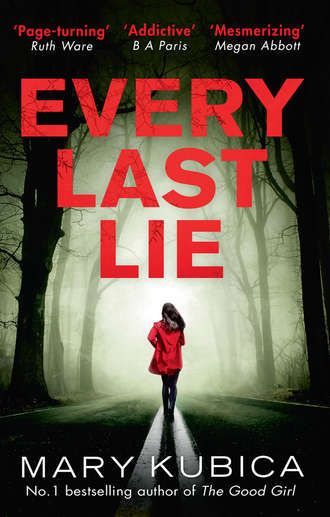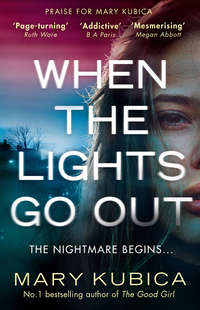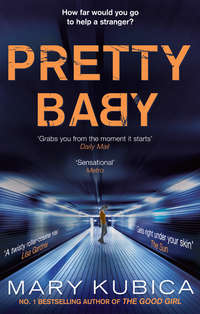
Полная версия
Every Last Lie
The windows are open. The ceiling fan whirls above us, as in one queen-size bed, Maisie and I sleep. Harriet the dog lies at the foot of it, Felix just three feet away in his bassinet. I don’t sleep because I have stopped sleeping. Sleep, like most things these days, evades me. The room is dark, save for the night-light Maisie insists upon because she is afraid of the dark. But the night-light casts shadows on the darkened walls, and it’s these shadows that I stare at as Felix sleeps and Harriet snores, and Maisie orbits the bed in her sleep, like space junk orbiting the earth, pulling the thin cotton sheet from my sweating body.
And then, come 1:37 a.m., Maisie sits upright in bed.
She talks in her sleep as much as she talks when awake, and so the grumbles that issue from her mouth are of little concern. They’re incomprehensible, mostly. Drivel. Until she begins speaking of Nick, that is. Until her eyes dart open, and she goggles me, her green eyes wide and scared. Her clammy little hand gropes for mine, and she calls out, she cries desperately, pleadingly, “It’s the bad man, Daddy. The bad man is after us!”
“Who, Maisie?” I ask, shaking her gently awake. But Maisie is already awake. At the foot of the bed, Harriet stirs, and beside us, Felix begins to cry. A small cry, merely fussing. He stretches his arms above his head, and I know in the moments to come his small cry will escalate into a full-out squall. Felix is ready to eat, and, as if in preparation, my chest leaks through my gown.
“Him!” she says insufficiently as she sinks low under the bedcovers and tosses them above her head. Maisie is hiding. Hiding from some man. A bad man that is coming after her and Nick. But Maisie knows nothing about bad men, or so I believe, and so I try to convince myself that it’s only make-believe, the hunters who killed Bambi’s mother or maybe Captain Hook coming after her and Nick in a dream. But as she says it again, wide-awake and far more terrified this time for it to be make-believe—the bad man is after us!—my mind makes up for Maisie’s lack of details, imagining a bad man trailing Nick and her down Harvey Road, and at this my heart begins to pound, my hands to sweat more than they are already sweating.
“Maisie,” I plead, as mollifying as I can, though inside I’m anything but relaxed. But Maisie is under the bedcovers now, and she is not speaking. When I try to touch her, she screams out, “Stop!” and then she goes silent, like some sort of toy whose batteries have just died. She’ll say nothing, though I ask and then I beg. And when the begging is ineffective, I find myself becoming angry. It’s out of desperation, only. The reason I become angry. There’s a desperate need to know what it is that Maisie’s prating about. What bad man? What does Maisie mean?
“If you tell me, Maisie, we can get donuts in the morning,” I say, with the promise of a Long John slathered in strawberry icing.
I promise other material things, as well—a new teddy bear, a hamster—hoping to lure her out of the pitch-black, suffocating world beneath those sheets. But that world beneath the sheets is also safe for Maisie, and so she won’t come.
By now, Felix has begun to scream. “Maisie,” I say again over the sound of Felix, trying to pry the covers from her hands. “What bad man?” I ask desperately, and it’s speculation only when I probe, “Was the bad man in a car?” and from under the covers I sense the nod of Maisie’s head and hear her tiny voice whisper, “Yes,” and at this I gasp.
A bad man. In a car. Following Maisie and Nick.
I stroke Maisie’s hair and force myself to take measured breaths, trying hard to remain calm as the world crumbles around me, and I find it harder and harder to breathe.
“The bad man,” Maisie blubbers again as I slip her teddy bear beneath the sheets and into her clammy hands, asking sedately, “Who, Maisie, who? What bad man?” though inside I feel anything but sedate. Who is the bad man that was following Nick and her? Who is the bad man that took my husband’s life?
And without sitting up in bed or sliding the covers from her face, she thrums, her voice masked by the density of the sheets, “The bad man is after us. He’s going to get us,” and with that she flies out from under the sheets like a rocket and into the master bath, where she makes haste of slamming closed and locking the door with so much zeal that a frame falls from the wall and smashes onto the floor, shattering into dozens of pieces.
NICK
BEFORE
There was no way I could have known that morning as I stood at the foot of our bed, watching Clara sleep, the way our lives would change. I stood there for longer than I planned to, staring at her as she lay on the bed sound asleep, completely transfixed by the movement of her eyes beneath their lids, the curve of her nose, the delicacy of her lips and hair. I listened to the sound of her breathing, flat, even breaths interrupted by the occasional gulp of air, the thin blue sheet pulled clear up to her neck, hiding our baby, so that it swelled with each breath.
I stood at the foot of the bed watching Clara sleep, wanting nothing more than to climb back into bed and spend the day wrapped up in each other as we used to do, to run my hands over the ballooning belly and spend hours trying to come up with a name for our baby boy.
There was no way I could have known, as I leaned over to plant a kiss on Clara’s forehead, that outside a storm was brewing, a supercell storm that would soon tear through our lives, and that all that unstable air moving around the atmosphere was waiting for us just outside the front door.
There was no way I could have known that I was running out of time.
* * *
Outside the bedroom door, Maisie stands, arms crossed across herself, her hair standing on end. She’s still half asleep, her eyes trying to adjust to the traces of light that come in through a hallway window. She rubs at her eyes. “Morning, Maisie,” I say in a whisper as I drop down to my knees and take her into my arms, this tiny little thing that collapses against me, tired and tuckered out. “How about we get you some breakfast and let Mommy sleep for a while?” I suggest, hoisting her into my arms and carrying her down the stairs, knowing how Clara’s nighttime sleep has been interrupted of late, always trammeled by her inability to find a comfortable position to sleep. For the last few weeks, the leg cramps have woken her in the middle of the night, either that or the baby kicking in earnest to get out. He’s got his days and his nights all mixed up, Clara said, though I find it hard to believe there’s some sort of timetable in utero, that the baby has any notion of when is night and when is day. But maybe.
I can’t do anything about the cramps or the kicking, but I can occupy Maisie for a while so that Clara can sleep.
I warm frozen waffles in the toaster oven and serve them to Maisie at the coffee table with a side of syrup. I brew my coffee—decaf, as if I am pregnant, too; my vow to Clara that she doesn’t have to suffer through this pregnancy alone—and pour Maisie juice. I turn on the TV for Maisie and set the kitchen timer for an hour. “Please, don’t wake Mommy until after two episodes of Max & Ruby or when the timer rings,” I say to her, adding, “Whichever comes first,” before planting a kiss on her forehead, too, one which is still waxy from sleep. “Did you hear me, Maisie?” I ask, and, “When can you wake Mommy?” just to be sure Maisie was listening and that she heard. Maisie is a smart girl—sometimes too smart for her own good—but she’s also four, eyes and ears lost to the cartoon bunnies that now fill our TV screen.
“When the timer rings,” she says, eyes not meeting mine. Harriet sits at the floor beside her feet, ever hopeful that Maisie will drop her waffles to the floor.
“Good girl.” I stuff my feet into a pair of shoes and find my car keys. “See you later, alligator,” I say, opening the garage door to leave.
“In a while, crocodile,” says Maisie, mouth stuffed full with food.
I make my way to the garage. I’m not halfway there when a text comes through on my phone, and I stop midstride to see who it is, groaning already because of course it’s bad news. Good news never arrives at 7:00 a.m. in the form of a text message.
Take your time, it says. Another cancellation. Wilsons flew the coop. —N
CLARA
Morning. A stay of execution for those who are grieving. The first few marks of sunlight appear in the darkened sky, bringing oxygen back to the stifled world and making it easier to breathe.
I wake on the floor beside the bathroom door, Felix spread lengthwise on my extended legs. The door to the bathroom, as I jiggle the glass knob for the eighteenth time, is locked. It’s an antique, a 1920s fluted crystal glass knob; we no longer have the key. Perhaps we never had the key, but this didn’t matter, not until Maisie took to locking herself on the wrong side of the door as she did last night when she cried out, The bad man is after us. He’s going to get us, before scurrying from bed.
She won’t come out.
There is glass everywhere, lying unprotected on the floor.
For four hours now, she’s been on the other side of the bathroom door and I’ve listened as her frenzied cry died down to a quiet drone, her requests for Daddy lessening as she sobbed herself to sleep. And now the sunlight appears, chasing the shadows away from the walls.
For hours I’ve replayed Maisie’s words over and over and over again in my mind: The bad man is after us. He’s going to get us. “Please, Maisie,” I beg for the forty-seventh time. “Please, come out.”
But Maisie won’t come out.
* * *
Maisie sits at the breakfast nook staring vacantly at three microwave pancakes set before her on a plate. There was only one squirt of syrup remaining in the bottle, and so her pancakes are mostly dry. But that’s not the reason she won’t eat. On the table before me, there is nothing, no food. I, too, won’t eat. Not until someone makes me, which will be soon. My father fills a mug of coffee for me and brings it to the nook, setting it on the wooden slab before me.
He pats my head. He tells me to drink. He tells Maisie to eat her pancakes.
In my bedroom upstairs, the bathroom door lies flat, the hinge pins tapped out of place with a nail and a hammer. My father talked me through it on the phone. He didn’t need to come, I told him. We were fine. Maisie was fine, Felix was fine, I was fine. But my father didn’t believe for one split second that any of us were fine. Maybe it was the panic in my voice, or the fact that Maisie had locked herself in the bathroom overnight and, on the mosaic tile floor, cried herself to sleep. I don’t know. Or maybe it was Felix, thrown into a state of hysteria once again, his tummy empty, and me too busy removing hinge pins from a raised panel door to feed him, after sixty-seven unsuccessful attempts to lure Maisie out on her own devices.
I can’t be in two places at one time.
“It’s okay to ask for help,” my father tells me now as Maisie stabs at those pancakes with a kid fork, some sort of adorable cow printed on its grippy, teal shank. But she doesn’t eat the pancakes. She mangles and dismembers them. She mutilates the pancakes. “You don’t have to do this alone, you know.”
But I am already alone, aren’t I? No matter how many people are here in this house with me, I am still alone.
My father has yet to go upstairs, to see the bathroom door lying listlessly on its back, the picture frame’s shards of glass sloshed across the floor, the stash of rumpled tissues into which I cried a small lake, my eyes now so red and puffy they’re practically swollen shut.
“I did ask for help,” I tell my father as he hands me my own plate of microwave pancakes sans syrup, with instructions to eat. “That’s why you’re here.” He fills his coffee mug with soapy water at the kitchen sink and swirls it around before plunging a dishrag into the ceramic. He won’t leave that mug for me to clean. He is a lean man, too lean, the hair on his own head reminiscent of that on Felix’s head. He dresses like an older man with the waistlines too high and the patterns of his collared shirts no longer in style but now considered vintage. On his wiry frame, his clothes droop and sag, his body getting swallowed by the fabric. He’s aging far too quickly for me.
“Did you find the check?” I ask him, remembering only then the missing check from my father’s tenants, a two thousand dollar rent payment that he endorsed but never deposited into the account. My mother is to thank for this, to be sure, my mother who is ever wandering about, misplacing things. The missing check was an exigent matter in the days before Felix’s birth and Nick’s death, somehow forgotten in the upheaval of the last few days, though it was less than a week ago that Izzy and I sat together, combing through my parents’ belongings for it, and coming up with nothing. Izzy, the paid babysitter, who watches over my mother when my father and I aren’t there. Izzy’s own parents died when she was eighteen and then nineteen—heart failure for one, followed by stage-four leukemia for the other—leaving her to care for an eight-year-old sister. Now, ten years later, she’s working hard to earn money to put the sister through college.
Izzy has been with my mother since the dementia began, or rather since we knew she had dementia and was not simply distracted and absentminded. She works for one of those home health agencies and, as my father says, is a godsend. Her hair is a short cropped cut—somehow decidedly masculine and feminine all at the same time—bleached white, and often adorned with flowers, her body decked out in an odd bricolage of things: skirts and tights, gimmicky jewelry, ornate socks pulled clear up to the knees. She has a silver pendant on a rolo chain, one that bears her name on a charm in an easy-to-read typeface, large enough for the elderly and disabled to see. Large enough for my mother to see, and when she gazes at her disoriented as she often does, Izzy plucks that trinket from around her neck and holds it out for my mother to see. Izzy, it reads.
Izzy cooks, she cleans, she micromanages my mother in the bathtub with reminders to wash this and to scrub that. She’s a babysitter to a degree, there whenever my father can’t be and sometimes when he is, to assure that my mother doesn’t hop in the car and decide to take it for a spin, or serve herself a bowl of cat litter and eat it with milk and a spoon, both of which she’s done before. More than once. Why do you even have cat litter when there is no cat? I’d asked my father at the time, and he shrugged his shoulders and said my mother insisted on it. Of course she did. Because to her there is still a cat, poor Oliver who was run over by a truck years ago.
She still sees him sometimes, hiding behind the curtain panels.
But the incident that takes the cake is the time she decided to give Maisie’s hair a trim, disappearing stealth-like into the kitchen and coming back moments later with a pair of scissors in hand. When we asked her why she did it, she said, Clara’s hair smells pungent, as Izzy drew her from the room that day while Maisie plummeted to the floor, crying. Like a dirty old sponge. That’s why. I can’t even get a comb through it anymore. It needed to be trimmed. It’s disgusting.
Clara’s hair.
My hair.
My mother has needed more and more assistance of late, no longer sleeping through the night, becoming nocturnal and spending her nights pacing the home, oftentimes crying for no apparent reason at all. Her brain no longer receives messages from the bladder that she needs to pee, and as a result she wets herself almost every day. She fought the illness tooth and nail once, using memory games, crossword puzzles, reams of sudoku. She memorized nursery rhymes to prove to herself that she could do it, and then waltzed around reciting the words to Simple Simon without a clue as to why. She read the newspaper; she exercised more and as often as she could, remembered to take her vitamins. She discovered that eating salmon helps with memory retention and took to eating it day in and day out, and she signed up for clinical trials to test the efficacy of experimental drugs. She pulled my old Simon memory game from storage and played it at great length.
Nothing worked; her mind continued to fade.
Izzy hadn’t wanted me to help look for the missing rent check that day for obvious reasons: I was nine months pregnant and could hardly walk. Why don’t you take a load off, she said to me as we drifted into my father’s office together, and I tried logging in to his bank account online, to be sure my father hadn’t deposited the check and somehow or other forgotten. My mother rarely left the house; it seemed the check had to be here somewhere, and yet it wasn’t. But as I sat down at the computer and found the slip of paper where my father kept a listing of his accounts and passwords, I felt the first contraction. Izzy gently withdrew the computer mouse from my hand and told me in no uncertain terms to leave, to go lie down, staring at me with a look of genuine fear at the prospect of childbirth. She took care of all kinds—women with dementia, aging men suffering from incontinence—but she didn’t deliver babies.
It’s nothing, I’m sure, I told her, trying hard to catch my breath from the shock of it, from the sudden pain. Just Braxton Hicks, I said. But still, I left to go home and lie down while Izzy continued the search. I assured her I’d check the account later, from home, but by the end of the night, Felix was born, and I, of course, had forgotten the password anyway, forgotten all about the missing check.
Now, standing in my kitchen, my father shakes his head. The check has not been found.
“Don’t worry about me,” he says. “You have a lot on your mind, and there’s plenty more money where that came from.” He pats my head in the way he did when I was just a girl, a statement, which is really neither here nor there, but altogether true. I have many things on my mind, though one thing eclipses all other thoughts this morning as I stare blankly out the double-hung windows and into the backyard, neglecting my pancakes as they drift from hot to warm to cool. Outside it is hot, as hot as it is inside our now un-air-conditioned home. Rain plays a game of hide-and-seek with us, here one day before disappearing again for another six. The lawn yellows with thirst, turning brittle in the sweltering summer heat. It is just after 9:00 a.m., and already the mercury on the thermometer reaches eighty degrees. Birds wait in vain on the perch of a backyard birdbath that has long since gone dry. That is something Nick is in charge of: feeding the birds, filling the birdbath. Even the birds miss Nick, the American goldfinch sitting on the edge of the resin birdbath, a female cardinal perched in the boughs of an evergreen tree.
The bad man is after us. He’s going to get us.
That’s the one thought on my mind. In no uncertain terms, Maisie has made it clear that Nick’s car accident was no accident at all. Maisie’s words return to me again and again, so many questions running through my mind. Does Maisie know this bad man? This bad man in a car that pushed Nick and her from the road? Did she get a glimpse of him before the car went airborne, flying into the tree? I want to ask Maisie, but I don’t want to upset her any more than she is already upset. And yet when my father steps from the room to gather laundry to wash for me, I lean across the breakfast nook and guardedly ask, “Did Daddy see the man in the car, Maisie? Did he see the bad man in the car?” Her eyes turn sad, and she nods her head a negligible yes. Nick saw the man. Before he died, Nick saw the man who was about to take his life.
But before I can ask more, my father returns.
Like Maisie, I stab at my pancakes. I mutilate them, too. My father tells me to eat.
* * *
It just so happens that Felix has a well-baby check this morning with the pediatrician. “You and Felix go alone and I’ll stay with Maisie,” my father says as he removes the breakfast dishes from the nook. “Take your time,” he adds. “Izzy is with your mom.”
Normally I would object but today I agree. Today there are other things on my mind, and I know that if Maisie were there, standing beside me on the minced gravel that flanks Harvey Road, there would be questions.
And so I leave the breakfast nook and slip away to my bedroom alone, stuffing myself into maternity clothes because that’s all I have that will fit. It doesn’t matter that there is no baby in my womb; my body has yet to collapse back into its original shape. I’m still fat. My uterus cramps and clenches, trying hard to shrink down to size. Involution, it’s called, the shrinkage of my uterus from a watermelon back to a pear, as lochia dribbles from my insides and every single atrium and artery and ventricle in my heart aches. My heart is broken, as is my womb.
It comes to me again in that moment, as I step into a pair of stretchy gray leggings and a sleeveless tunic top: Nick is dead. I reach into his dresser drawer, plucking undershirts out at random, pressing them to my face in an attempt to breathe in his scent, an intoxicating combination of deodorant, cologne and aftershave, finding that Nick’s scent has been washed clean and replaced with lavender detergent, a realization that again makes me cry. I dig deeper into the drawer, smelling them all, hoping to find one on which his scent remains. But I find none. No undershirts that smell of Nick, but what I do find, tucked there beneath a dozen white undershirts, is a scrap of paper that for whatever reason piques my interest, paper where no paper should be. I set the shirts aside and grope for the scrap, finding a receipt to the local jewelry store in excess of four hundred dollars. The receipt is dated months ago, and under the line item it reads pendant necklace. Unconsciously my hands go to my neck, knowing there’s no necklace there. Nick never gave me a necklace, nor is my birthday or our anniversary coming anytime soon. My stomach clenches. This necklace isn’t for me.
Nick spent four hundred dollars on a necklace that wasn’t meant for me? How could that be?
It’s a mistake only, I assure myself, rummaging for excuses and coming up near empty. I decide that the receipt must belong to another man, to some other man who bought his lovely wife a four-hundred-dollar pendant necklace. A mix-up at the dry cleaner’s, I also decide. Somehow or other, this receipt found its way from another man’s shirt pocket into Nick’s dresser drawer.
It makes no logical sense, and yet it’s far better than considering the alternative.
There’s no way in the world Nick was having an affair.
In the bedroom, I refuse to make eye contact with the shards of broken picture frame glass, or the bathroom door lying prostrate on the wooden floorboards—memories of Maisie’s and my night. I don’t look in the mirror to see the redness of my eyes.
I find the spare car keys and, with a kiss to Maisie’s head and a pat on my father’s arm, Felix and I leave.
NICK
BEFORE
Stacy is waiting for me in the parking lot when I pull into work. In her hands rest two Starbucks cups, one for her and one for Dr. C, both containing an overdose of caffeine. She holds them out to torment me and says the exact same thing that’s on my mind, “Two more months,” because we both know I’ll be celebrating my baby’s arrival with a venti coffee, fully loaded, to make up for nine months of caffeine withdrawal.
The headaches were stymieing at first, enough that I almost caved after the first two days. Like some sort of alcoholic on a drinking binge, I sneaked into the closest chain coffee shop twice a day and stood in line, standing there with no intent to buy, inhaling the aroma of freshly brewed coffee to see if it was enough to jump-start my day. One time I even ordered a double espresso, but before the barista could hand it to me, I changed my mind. Trust is one of the pillars of a good marriage, the foundation a marriage is built upon. I had made a promise to Clara, and I intended to keep it.
Now, as I hold open the door for Stacy and she and her two cups of coffee pass through, I tell myself only two more months to go. Two more months until I can drink caffeine, too. “Your perseverance is quite impressive, my friend,” says Stacy as I follow her into the dental practice that bears my name on the front door, Solberg & Associates Family Dental. It’s a space that’s entirely chic—and not at all my style—Clara’s design because it was the only way she’d say yes to my idea of starting my own practice. To me, it just made sense. There were more start-up costs initially, but in the long run we, Clara and me, would see the financial benefits of owning our own practice, as well as being blessed with financial independence that working for another practice would curtail. That’s the way I explained it to Clara anyway, a few years ago as we sat at the breakfast nook of the fixer-upper we’d just bought for a steal, well below asking price because my negotiation skills weren’t half bad, Clara’s disinterested eyes glazing over as I went on and on about the costs of a tenant upfit to an existing commercial structure, dental lenders, malpractice insurance and operating fees—employee salaries, office equipment, the pricey drip coffee maker I’d go nine months without being able to use.






